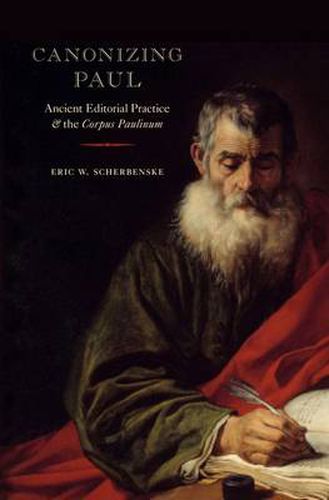Readings Newsletter
Become a Readings Member to make your shopping experience even easier.
Sign in or sign up for free!
You’re not far away from qualifying for FREE standard shipping within Australia
You’ve qualified for FREE standard shipping within Australia
The cart is loading…






Canonizing Paul explores how ancient editorial practices utilized in the publication of corpora (e.g. preparation of texts, selection and arrangement of tracts, and composition and deployment of paratexts) were not only employed to shape editions of Paul’s letters (i.e. the Marcionite, Euthalian, and Vulgate), but also their interpretation. By considering the deployment of ancillary materials alongside other editorial practices and exploring the interpretive interplay (and sometimes uneasy negotiation) of text and paratexts, this study fills an often overlooked gap in the field of New Testament textual criticism. Investigation into the Marcionite edition shows how its paratexts introduced Marcion’s hermeneutic and, in some measure, justified his editorial principles. The Euthalian edition preferred instead a catechetical and pedagogical goal extending from the deployment of paratexts to the organization of the tracts and a textual arrangement for ease of comprehension. The exploration of text and sometimes disparate paratexts culminates in an investigation of Codex Fuldensis, which transmits the Vulgate textual revision of Paul’s letters and its Primum Quaeritur prologue alongside numerous other paratexts such as the Marcionite prologues, Old Latin capitula, capitula drawn from the Euthalian edition, and sundry other paratexts. The incorporation of such diverse paratexts, loosed from their original editions and juxtaposed with later editorial products founded on alternative hermeneutical presuppositions, resulted in interpretive tensions that testify to the physical manuscript as a locus of authority, over which many early Christians were trying to gain interpretive control, if not by altering the text, then by furnishing paratexts. By demonstrating how these practices and interpretive concerns left their mark on these editions of the Corpus Paulinum, this study reveals that editorial practices and hermeneutics were deeply, sometimes inextricably, intertwined.
$9.00 standard shipping within Australia
FREE standard shipping within Australia for orders over $100.00
Express & International shipping calculated at checkout
Canonizing Paul explores how ancient editorial practices utilized in the publication of corpora (e.g. preparation of texts, selection and arrangement of tracts, and composition and deployment of paratexts) were not only employed to shape editions of Paul’s letters (i.e. the Marcionite, Euthalian, and Vulgate), but also their interpretation. By considering the deployment of ancillary materials alongside other editorial practices and exploring the interpretive interplay (and sometimes uneasy negotiation) of text and paratexts, this study fills an often overlooked gap in the field of New Testament textual criticism. Investigation into the Marcionite edition shows how its paratexts introduced Marcion’s hermeneutic and, in some measure, justified his editorial principles. The Euthalian edition preferred instead a catechetical and pedagogical goal extending from the deployment of paratexts to the organization of the tracts and a textual arrangement for ease of comprehension. The exploration of text and sometimes disparate paratexts culminates in an investigation of Codex Fuldensis, which transmits the Vulgate textual revision of Paul’s letters and its Primum Quaeritur prologue alongside numerous other paratexts such as the Marcionite prologues, Old Latin capitula, capitula drawn from the Euthalian edition, and sundry other paratexts. The incorporation of such diverse paratexts, loosed from their original editions and juxtaposed with later editorial products founded on alternative hermeneutical presuppositions, resulted in interpretive tensions that testify to the physical manuscript as a locus of authority, over which many early Christians were trying to gain interpretive control, if not by altering the text, then by furnishing paratexts. By demonstrating how these practices and interpretive concerns left their mark on these editions of the Corpus Paulinum, this study reveals that editorial practices and hermeneutics were deeply, sometimes inextricably, intertwined.